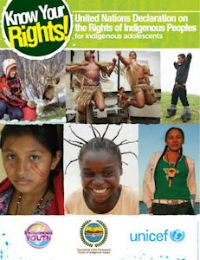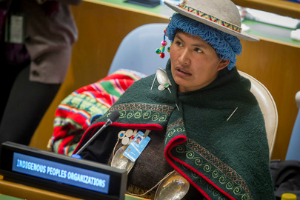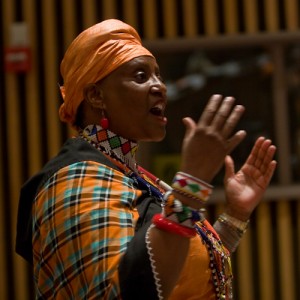Publications
Displaying 701 - 710 of 726
Briefing Note 1: Gender and Indigenous Peoples
Briefing Note 2: Gender and Indigenous Peoples' Economic and Social Development
Briefing Note 3: Gender and Indigenous Peoples' Education
Briefing Note 4: Gender and Indigenous Peoples' Culture
Briefing Note 5: Gender and Indigenous Peoples' Environment
Briefing Note 6: Gender and Indigenous Peoples' Human Rights
Know your Rights: Adolescent friendly version of the Declaration on the Rights of Indigenous Peoples
Conoce tus Derechos: Declaración de la ONU sobre los Derechos de los Pueblos Indígenas para adolescentes
Декларация Организации Объединенных Наций о правах коренных народов:для детей подросткового возраста из числа коренных народов
[accordion clicktoclose="true"][accordion-item title="Handbooks and Training Materials"]
Implementing the UN Declaration on the Rights of Indigenous Peoples: Handbook for Parliamentarians
Training Module on Indigenous Peoples’ Issues
United Nations Development Group Guidelines on Indigenous Peoples' Issues
Resource Kit on Indigenous Peoples´…
A Message Stick is a traditional Australian Aboriginal method of correspondence whereby runners would deliver messages carved in symbols on a piece of wood to inform other indigenous peoples of upcoming events.
The Message Stick is a quarterly newsletter that highlights the efforts and activities of the United Nations Permanent Forum on Indigenous Issues. Please send any feedback you may have to indigenous_un@un.org.
2015
MESSAGE STICK - March 2015
AR | EN | ES | FR | RU | ZH
2014
MESSAGE STICK - December2014
AR | EN | ES | FR | RU | ZH
MESSAGE STICK - October 2014
AR | EN | ES | FR | RU | ZH
MESSAGE STICK - June 2014
AR | EN | ES | FR | RU | ZH
MESSAGE STICK…
Newsletter
Message Sticks
A Message Stick is a traditional Australian Aboriginal method of correspondence whereby runners would deliver messages carved in symbols on a piece of wood to inform other indigenous peoples of upcoming events. The Message Stick is a quarterly newsletter that highlights the efforts and activities of the United Nations Permanent Forum on Indigenous Issues. Please send any feedback you may have to indigenous_un@un.org.
2015
MESSAGE STICK - March 2015
AR | EN | ES | FR | RU | ZH
2014
MESSAGE STICK - December 2014
AR | EN | ES | FR | RU | ZH
MESSAGE STICK - October 2014
AR | EN | ES | FR | RU | ZH
MESSAGE STICK - June 2014…
2015
2014
2013
2012
2011
2010
2009
2008
2007
2006
2005
2004
SG Reports:
GA70 SG Report: Progress made in the implementation of the outcome document of the WCIP
Resolutions:
General Assembly Resolutions
A/RES/70/232 Resolution adopted by the General Assembly on 23 December 2015
A/RES/69/159 Rights of Indigenous Peoples (18 December 2014)
A/RES/68/149 Rights of Indigenous Peoples (18 December 2013) RA/ES/67/153 Rights of indigenous peoples (20 December 2012)
Press release: GA/SHC/4063A/RES/66/296 Organization of the High-level Plenary Meeting of the General Assembly, to be known as the World Conference on Indigenous Peoples (17 September 2012)
Press release: GA/11283.
Adopted without vote.A/RES/66/142…
A/RES/69/159 Rights of Indigenous Peoples (18 December 2014)
A/RES/68/149 Rights of Indigenous Peoples (18 December 2013) RA/ES/67/153 Rights of indigenous peoples (20 December 2012)
Press release: GA/SHC/4063A/RES/66/296 Organization of the High-level Plenary Meeting of the General Assembly, to be known as the World Conference on Indigenous Peoples (17 September 2012)
Press release: GA/11283.
Adopted without vote.A/RES/66/142…
A/75/255 Report of the Secretary-General: Enhancing the participation of indigenous peoples' representatives and institutions in meetings of relevant United Nations bodies on issues affecting them (27 July 2020).
A/70/84–E/2015/76 Report of the Secretary-General: Progress made in the implementation of the outcome document of the high-level plenary meeting of the General Assembly known as the World Conference on Indigenous Peoples (18 May 2015)
A/69/271 Report of the Secretary-General: Achievement of the goal and objectives of the Second International Decade of the World’s Indigenous People (6 August 2014)
A/HRC/21/24 Report of the Secretary-General:…
A/RES/78/328 Enhancing the participation of Indigenous Peoples' representatives and institutions in meetings of relevant United Nations bodies on issues affecting them (11 September 2024)
A/77/460 Rights of Indigenous Peoples (15 December 2022)
A/RES/76/148 Rights of indigenous peoples (16 December 2021)
A/RES/75/475 Rights of indigenous peoples (16 December 2020)
A/RES/74/135 Rights of indigenous peoples (18 December 2019)
A/RES/73/156 Rights of indigenous peoples (18 December 2018)
A/RES/72/155 Rights of indigenous peoples (19 December 2017)
A/RES/71/178 Rights of Indigenous Peoples (19 December 2016)
A/RES/70/232 Rights of indigenous…
 Welcome to the United Nations
Welcome to the United Nations


